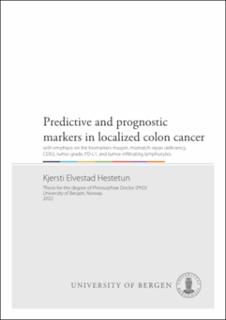| dc.contributor.author | Hestetun, Kjersti Elvestad | |
| dc.date.accessioned | 2022-06-10T07:14:40Z | |
| dc.date.available | 2022-06-10T07:14:40Z | |
| dc.date.issued | 2022-06-23 | |
| dc.date.submitted | 2022-06-06T21:12:51.456Z | |
| dc.identifier | container/83/c2/21/55/83c22155-4dcb-4976-a329-a94dbcffebd0 | |
| dc.identifier.isbn | 9788230844076 | |
| dc.identifier.isbn | 9788230849262 | |
| dc.identifier.uri | https://hdl.handle.net/11250/2998228 | |
| dc.description.abstract | Colon cancer is one of the most common cancers worldwide. Predicting disease outcomes is challenging. Around 15-20% of patients will experience disease relapse. At the same time, a substantial fraction of patients will receive unnecessary treatment with chemotherapy after primary surgery with the risk of developing long-term adverse effects. Therefore, there is an urgent need for specialized biomarkers to improve patient survival and avoid over-treatment.
We aimed to examine biomarkers with potential prognostic and/or predictive value in colon cancer. This thesis covers the investigation of the biomarkers maspin (SERPINB5), caudal type homeobox 2 (CDX2), tumor grade, mismatch repair (MMR) deficiency, programmed death-ligand 1 (PD-L1), and tumor-infiltrating lymphocytes.
Two different cohorts of patients were included in this study. The NGICG cohort consists of patients with colon or rectal cancer stage II and III randomized to receive fluorouracil after surgery or to surgery alone. The HDH cohort consists of patients with colon cancer stage I-III treated according to existing guidelines. Detailed clinicopathological data and follow-up data were available from both cohorts. Immunohistochemistry was performed for maspin, CDX2, CD3, CD8, PD-L1, MLH1, MSH2, MSH6, and PMS2. Information about tumor grade was retrieved from the initial pathology assessment.
In paper I, we show that a low expression of nuclear maspin predicted the effect of adjuvant fluorouracil/levamisole in the randomized cohort. Neither nuclear nor cytoplasmic expression of maspin was associated with prognosis. Nuclear maspin expression was not associated with any clinicopathological variables.
Paper II demonstrates the association between low CDX2 expression and deficient mismatch repair, high tumor grade, and right-sided primary in stage II-III colon cancer. Patients with low CDX2 expression combined with proficient MMR (pMMR) had a very poor prognosis. Cases with pMMR and high tumor grade had a poor prognosis when treated with surgery only. High tumor grade did not convey a poor prognosis for pMMR patients randomized to receive adjuvant chemotherapy, indicating that these patients respond well to adjuvant fluorouracil-based chemotherapy.
In paper III, deficient MMR (dMMR) was associated with a poor prognosis in stage III colon cancer, compared to pMMR cases. dMMR stage II patients had an improved prognosis, suggesting the presence of a prognostic shift in localized dMMR colon cancer. Our multivariate models demonstrated a significant statistical interaction between MMR phenotype and stage. Density of tumor-infiltrating lymphocytes was an independent prognostic marker with higher density associated with improved prognosis. PD-L1 expression was not associated with prognosis. The prognostic shift demonstrated in the multivariate models was significant also when adjusted for the influence of PD-L1 expression, CDX2 expression, chemotherapy, and TIL density.
In conclusion, a low expression of maspin might predict the effect of adjuvant chemotherapy. Still, there is no consensus in the present literature regarding the predictive and prognostic value of maspin. Currently, the maspin biomarker is not ready for clinical implementation. According to our findings, the combination of pMMR and low CDX2 expression identifies a group of stage II and III patients with a high risk of recurrence. We believe that CDX2 can become an important marker in the treatment stratification of stage II and III pMMR colon cancer. High tumor grade is acknowledged as a minor risk factor in stage II colon cancer, and, standing alone, it does not warrant treatment with adjuvant chemotherapy. As pMMR patients with high tumor grade seem to respond well to chemotherapy, the benefit of adjuvant chemotherapy for this group should be re-assessed. Our study demonstrates a poor prognosis for dMMR stage III colon cancer patients. Few studies assess the prognosis of dMMR stage III colon cancers separately, and our results call for validation in larger cohorts. If confirmed, these results may impact the clinical recommendations for dMMR stage III colon cancer as this tumor phenotype responds well to immunotherapy. | en_US |
| dc.language.iso | eng | en_US |
| dc.publisher | The University of Bergen | en_US |
| dc.relation.haspart | Paper I: Hestetun KE, Brydøy M, Myklebust MP, Dahl O. Nuclear maspin expression as a predictive marker for fluorouracil treatment response in colon cancer. Acta Oncol. 2015;54:470-9. The article is not available in BORA due to publisher restrictions. The published version is available at: <a href="https://doi.org/10.3109/0284186X.2014.952386" target="blank">https://doi.org/10.3109/0284186X.2014.952386</a> | en_US |
| dc.relation.haspart | Paper II: Hestetun KE, Aasebø K, Rosenlund NB, Müller Y, Dahl O, Myklebust MP. Mismatch repair phenotype determines the implications of tumor grade and CDX2 expression in stage II-III colon cancer. Mod. Pathol. 2021;34:161-70. The article is not available in BORA due to publisher restrictions. The published version is available at: <a href="https://doi.org/10.1038/s41379-020-0634-9" target="blank">https://doi.org/10.1038/s41379-020-0634-9</a> | en_US |
| dc.relation.haspart | Paper III: Hestetun KE, Rosenlund NB, Stanisavljević L, Dahl O, Myklebust MP. Stagedependent prognostic shift in mismatch repair-deficient tumors: assessing patient outcomes in stage II and III colon cancer. The article is not available in BORA. | en_US |
| dc.rights | Attribution-NoDerivs (CC BY-ND). This item's rights statement or license does not apply to the included articles in the thesis. | |
| dc.rights.uri | https://creativecommons.org/licenses/by-nd/4.0/ | |
| dc.title | Predictive and prognostic markers in localized colon cancer : with emphasis on the biomarkers maspin, mismatch repair deficiency, CDX2, tumor grade, PD-L1, and tumor-infiltrating lymphocytes. | en_US |
| dc.type | Doctoral thesis | en_US |
| dc.date.updated | 2022-06-06T21:12:51.456Z | |
| dc.rights.holder | Copyright the Author. | en_US |
| dc.contributor.orcid | 0000-0001-7357-0440 | |
| dc.description.degree | Doktorgradsavhandling | |
| fs.unitcode | 13-25-0 | |

